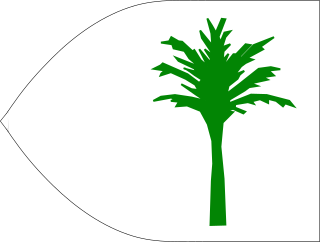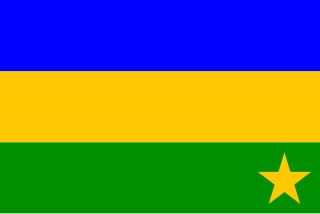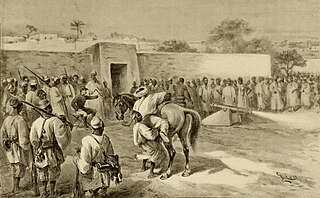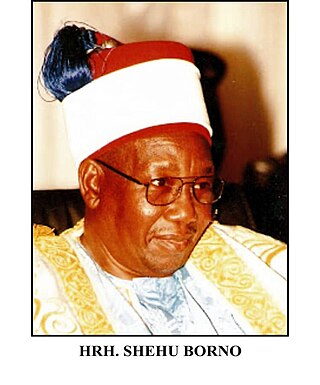
The Kanem–Bornu Empire existed in areas which are now part of Nigeria, Niger, Cameroon, Libya and Chad. It was known to the Arabian geographers as the Kanem Empire from the 8th century AD onward and lasted as the independent kingdom of Bornu until 1900.

The Kanuri people are an African ethnic group living largely in the lands of the former Kanem and Bornu Empires in Niger, Nigeria, Chad, and Cameroon. As well as a diaspora community residing in Sudan. Those generally termed Kanuri include several subgroups and dialect groups, some of whom identify as distinct from the Kanuri. Most trace their origins to ruling lineages of the medieval Kanem-Bornu Empire, and its client states or provinces. In contrast to the neighboring Toubou or Zaghawa pastoralists, Kanuri groups have traditionally been sedentary, engaging in farming, fishing the Chad Basin, trade, and salt processing.

The Bayero University Kano (BUK) is a university situated in Kano, Kano State, Nigeria. It was founded in 1975, when it was renamed from Bayero University College and upgraded from University College to University. It is the first university in Kano State, North-western Nigeria.

Rabih az-Zubayr ibn Fadl Allah or Rabih Fadlallah, usually known as Rabah in French, was a Sudanese warlord and slave trader who established a powerful empire east of Lake Chad, in today's Chad.

Barewa College is a college in Zaria, Kaduna State, northern Nigeria. Founded in 1921 by British Governor General Hugh Clifford, it was originally known as Katsina College. It switched its name to Kaduna College in 1938 and to Government College, Zaria in 1949 before settling on Barewa College. It is one of the largest boarding schools in Northern Nigeria and was the most-celebrated post-primary schools there up to the early 1960s. The school is known for the large number of elites from the region who attended and counts among its alumni include Tafawa Balewa who was Prime Minister of Nigeria from 1960 to 1966, four heads of state of Nigeria. The school is located along Gaskiya road in the Tukur -Tukur area of Zaria.

Shehu al-Hajj Muhammad al-Amîn ibn Muhammad al-Kânemî (1776–1837) was an Islamic scholar, teacher, religious and political leader who advised and eventually supplanted the Sayfawa dynasty of the Kanem-Bornu Empire. In 1846, Al-Kanemi's son Umar I ibn Muhammad al-Amin became the sole ruler of Borno, an event which marked the end of the Sayfawa dynasty's eight hundred year rule. The current Shehu of Bornu, a traditional ruler whose seat remains in modern Borno State, Nigeria, is descended from Al-Kanemi.
The Borno Emirate, or Borno Sultanate, is a traditional Nigerian state that was formed at the start of the 20th century. It is headed by the descendants of the rulers of the Bornu Empire, founded before 1000. The rulers have the title Shehu of Borno. The traditional emirate of Borno maintains a ceremonial rule of the Kanuri people, based in Maiduguri, Borno State, Nigeria, but acknowledged by the 4 million Kanuri in neighbouring countries.
The Dikwa Emirate is one of the successor states to the old Bornu Empire, a traditional state within Borno State, Nigeria. It was established in 1901 at the start of the colonial period after the Bornu empire had been partitioned between the British, French and Germans.
Bukar or Bukar Kura bin Umar al-Kanemi was Shehu of Borno from 1881 to c. 1884.
Ibrahim or Ibrahim bin Umar al-Kanemi was Shehu of Borno from c. 1884 to c. 1885.

Ashimi or Hashim bin Umar al-Kanemi (1840s-1893) was Shehu of Borno from ca.1885 to 1893.

Shehu Umar Sanda ibn Ibrahim Kura al-Kanemi was the Shehu of Borno from 1922 to 1937. He was the son of Shehu Ibrahim Kura of Borno and brother of Shehu Abubakar Garbai.

Shehu Mustafa Ibn Umar El-Kanemi was the Shehu of Borno from 1974 to 2009.

Abubakar Ibn Umar Garba Al Amin El-Kanemi Shehu Of Borno is the Shehu, or traditional ruler, of the Borno Emirate in northeast Nigeria.
Modibbo Raji was a 19th-century Fulani Islamic scholar who was part of the community of Usman Dan Fodio, founder of the Sokoto Caliphate, and his brother Abdullahi dan Fodio. After a long career as a teacher, Qadi, Naib and Wazir (vizier) in the Gwandu Emirate under his mentor Abdullahi dan Fodio and his successors, Modibbo Raji emigrated in the 1850s and eventually settled in Adamawa. He is generally regarded as the founder of the Islamic scholarly tradition in Adamawa as well as one of the earliest exponents of the Tijjaniyya Islamic sect in the Sokoto Caliphate. He died c. 1865 and was buried in Yola leaving behind his writings both in Arabic and Fulfulde, and a large scholarly community of his sons, daughters, students and associates.

Hausa literature is any work written in the Hausa language. It includes poetry, prose, songwriting, music, and drama. Hausa literature includes folk literature, much of which has been transcribed, and provides a means of recording, preserving, and transmitting knowledge, especially in regard to social, psychological, spiritual, or political roles.
Ahmadu Bello UniversityZaria is a federal government research university located in Zaria, Kaduna State, Nigeria, opened in 1962 as the University of Northern Nigeria. It was founded by and is now named for Ahmadu Bello, the first premier of Northern Nigeria.
Gombe-Abba was established by Modibbo Buba yero, the student of Usman Dan Fodiyo, after the 1804 Jihad war. It is located about a kilometre off the Gombe - Kano highway, near a river and on a hilly area. Gombe Abba is the first capital of Gombe Emirate and inextricable part of Gombe history.














